 Movies and TV
Movies and TV  Movies and TV
Movies and TV  History
History 10 Momentous Events That Also Occurred on July 4th
 Animals
Animals 10 Times Desperate Animals Asked People for Help… and Got It
 Movies and TV
Movies and TV 10 Movie Flops That Found Their Way to Cult Classic Status
 History
History 10 Things You Never Knew About Presidential First Ladies
 Movies and TV
Movies and TV 10 Zombie Movies That Will Actually Terrify You
 Humans
Humans 10 Times Scientists Were Absolutely Sure… and Absolutely Wrong
 Our World
Our World 10 Pivotal Moments for Life on Earth
 Movies and TV
Movies and TV 10 Most Realistic Medical TV Shows of All Time
 Creepy
Creepy 10 Eerie & Mysterious Ghosts of the Pacific Coast
 Movies and TV
Movies and TV 10 Music Biopics That Actually Got It Right
 History
History 10 Momentous Events That Also Occurred on July 4th
 Animals
Animals 10 Times Desperate Animals Asked People for Help… and Got It
Who's Behind Listverse?

Jamie Frater
Head Editor
Jamie founded Listverse due to an insatiable desire to share fascinating, obscure, and bizarre facts. He has been a guest speaker on numerous national radio and television stations and is a five time published author.
More About Us Movies and TV
Movies and TV 10 Movie Flops That Found Their Way to Cult Classic Status
 History
History 10 Things You Never Knew About Presidential First Ladies
 Movies and TV
Movies and TV 10 Zombie Movies That Will Actually Terrify You
 Humans
Humans 10 Times Scientists Were Absolutely Sure… and Absolutely Wrong
 Our World
Our World 10 Pivotal Moments for Life on Earth
 Movies and TV
Movies and TV 10 Most Realistic Medical TV Shows of All Time
 Creepy
Creepy 10 Eerie & Mysterious Ghosts of the Pacific Coast
Top 15 Misconceptions about Evolution
Biological evolution is descent with modification. This definition encompasses small-scale evolution (changes in gene frequency in a population from one generation to the next) and large-scale evolution (the descent of different species from a common ancestor over many generations). Evolution helps us to understand the history of life. While evolution is very widely accepted, many people hold to misconceptions about it. This list should help to dispel some of those myths.
 15. Evolution is a theory about the origin of life
15. Evolution is a theory about the origin of life
The theory of evolution primarily deals with the manner in which life has changed after its origin. While science is interested in the origins of life (for example the composition of the primeval sludge from which life might have come) but these are not issues covered in the area of evolution. What is known is that regardless of the start, at some point life began to branch off. Evolution is, therefore, dedicated to the study of those processes.
14. Organisms are always getting better
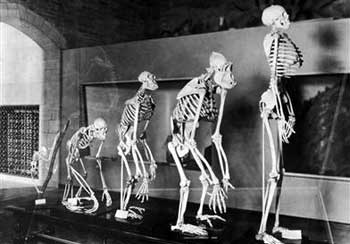
While it is a fact that natural selection weeds out unhealthy genes from the gene pool, there are many cases where an imperfect organism has survived. Some examples of this are fungi, sharks, crayfish, and mosses – these have all remained essentially the same over a great period of time. These organisms are all sufficiently adapted to their environment to survive without improvement.
Other taxa have changed a lot, but not necessarily for the better. Some creatures have had their environments changed and their adaptations may not be as well suited to their new situation. Fitness is linked to their environment, not to progress.
13. Evolution means that life changed ‘by chance’
In fact, natural selection is not random. Many aquatic animals need speed to survive and reproduce – the creatures with that ability are more suited to their environment and are more likely to survive natural selection. In turn, they will produce more offspring with the same traits and the cycle continues. The idea that evolution occurs by chance does not take the entire picture in to account.
12. Natural selection involves organisms ‘trying’ to adapt
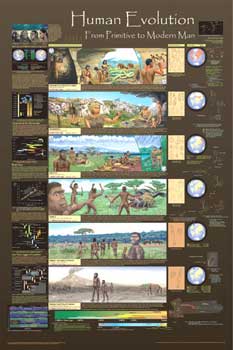
Organisms do not “try” to adapt – it is natural selection that enables various members of a group to survive and reproduce. Genetic adaptation is entirely outside of the power of the developing organism.
11. Natural selection gives organisms what they ‘need.’
Natural selection has no “intelligence” – it can not tell what a species needs. If a population has genetic variants that are more suited to their environment, they will reproduce more in the next generation and the population will evolve. If a genetic variant is not present, the population will most likely do – or it will survive with little evolutionary change.
10. Evolution is ‘just’ a theory
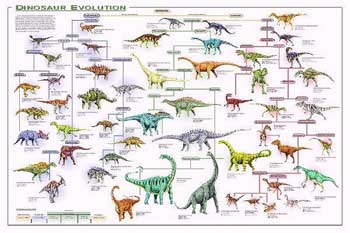
Scientifically speaking, a theory is a well substantiated idea that explains aspects of the natural world. Unfortunately other definitions of theory (such as a “guess” or a “hunch”) cause a great deal of confusion in the non-scientific world when dealing with the sciences. They are, in fact, two very different concepts.
9. Evolution is a Theory in Crisis
There is no debate in science as to whether or not evolution occurred – there is, however, debate over how it happened. The minutiae of the process is vigorously debated which can cause anti-evolutionists to believe that the theory is in crisis. Evolution is sound science and is treated as such by scientists worldwide.
8. Gaps in the Fossil Record Disprove Evolution
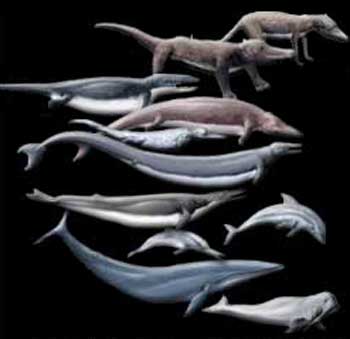
Actually, many transitional fossils do exist – for example, there are fossils of transitional organisms between modern birds and their dinosaur ancestors, as well as whales and their land mammal ancestors. There are many transitional forms that have not been preserved, but that is simply because some organisms do not fossilize well or exist in conditions that do not allow for the process of fossilization. Science predicts that there will be gaps in the record for many evolutionary changes. This does not disprove the theory.
7. Evolutionary Theory is Incomplete
Evolutionary science is a work in progress. Science is constantly making new discoveries with regard to it and explanations are always adjusted if necessary. Evolutionary theory is like all of the other sciences in this respect. Science is always trying to improve our knowledge. At present, evolution is the only well-supported explanation for all of life’s diversity.
6. The Theory is Flawed
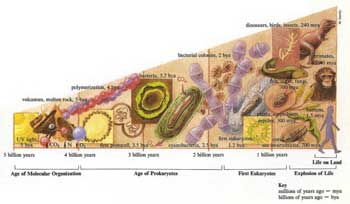
Science is an extremely competitive field – if any flaws were discovered in evolutionary theory they would be quickly corrected. All of the alleged flaws that creationists put forth have been investigated careful by scientists and they simply do not hold water. They are usually based on misunderstandings of the theory or misrepresentation of the evidence.
5. Evolution is not science because it is not observable
Evolution is observable and testable. The confusion here is that people think science is limited to experiments in laboratories by white-coated technicians. In fact, a large amount of scientific information is gathered from the real world. Astronomers can obviously not physically touch the objects they study (for example stars and galaxies), yet a great deal of knowledge can be gained through multiple lines of study. This is true also of evolution. It is also true that there are many mechanisms of evolution that can be, and are studied through direct experimentation as with other sciences.
4. Most Biologists have rejected Darwinism
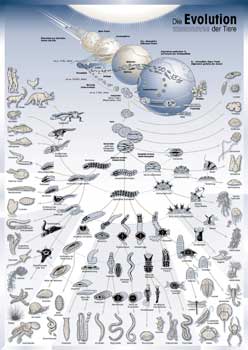
Scientists do not reject Darwin’s theories, they have modified it over time as more knowledge has been discovered. Darwin considered that evolution proceeds at a deliberate, slow pace – but in fact it has now been discovered that it can proceed at a rapid pace under some circumstances. There has not been, so far, a credible challenge to the basic principles of Darwin’s theory. Scientists have improved and expanded on Darwin’s original theory of natural selection – it has not been rejected, it has been added to.
3. Evolution Leads to Immoral Behavior
All animal species have a set of behaviors that they share with other members of their species. Slugs act like slugs, dogs act like dogs, and humans act like humans. It is preposterous to presume that a child will begin to behave like another creature when they discover that they are related to them. It is nonsensical to link evolution to immoral or inappropriate behavior.
2. Evolution Supports “Might Makes Right”
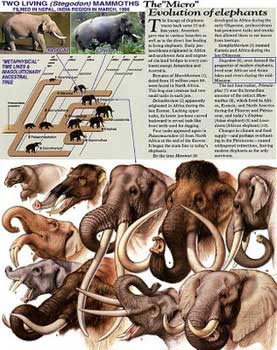
In the 19th and early 20th century, a philosophy called “Social Darwinism” sprung up from misguided attempts to apply biological evolution to society. This philosophy said that society should allow the weak to fail and die, and that not only is this an ideal situation, but a morally right one. This enabled prejudices to be rationalized and ideas such as the poor deserved their situation due to being less fit were very popular. This was a misappropriation of science. Social Darwinism has, thankfully, been repudiated. Biological evolution has not.
1. Teachers Should Teach Both Sides
There are tens of thousands of different religious views concerning creation. It is simply impossible for all of these views to be presented. Furthermore, none of the theories are based in science and therefore have no place in a science classroom. In a science class, students can debate where a creature branched off in the tree of life, but it is not right to argue a religious belief in a science class. The “fairness” argument is often used by groups attempting to inject their religious dogmas in to the scientific curricula.
This list was inspired by the brilliant Berkeley, Evolution 101 FAQ.








